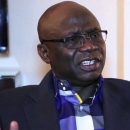Officials accused of mindset of disbelief towards refugees fleeing countries such as Uganda where homosexuality is illegal
The young boys from Africa were told to lie on their bellies and shoot with a make-believe rifle. The thinking among some watching Home Office officials was that those who adopted a correct sniping position were more likely to be bona-fide child soldiers; youngsters who failed to demonstrate a polished killing technique had a slimmer chance of winning asylum.
Four years on and this mindset on the part of officials appears to have been replicated, this time with regard to sexuality. Operating in a context of increasingly bellicose government rhetoric on immigration and a fear of false claims, the Home Office stands accused of instigating an attitude of disbelief towards those fleeing persecution from the 75 countries or so where homosexuality is illegal. In effect, individuals must undertake the delicate task of convincing a disbelieving stranger that they are gay.
One asylum seeker who endured the "humiliating" process is Sharon, from Uganda. Her Home Office interview left the 27-year-old so "intimidated" that days later she was prescribed antidepressants and remains on them a year later. "I was asked by a male interviewer how I, as a Christian, could justify my sexuality with God. He asked me how could I know I was a lesbian if I had never slept with a man. He kept asking me where I had sex with my female partners. I felt that he had established in his mind that I was lying."
Such accounts are common, say immigration lawyers, among whom disquiet at the government's approach has escalated. Their concern is reinforced by a transcript leaked to the Observer, of questions put to an asylum seeker by Home Office officials.
An investigation by the UK Lesbian and Gay Immigration Group, published last September, crystallised concerns about the handling of sexuality-based asylum claims. One judge called the approach "borderline pornographic".
Analysing dozens of cases the report exposed officials' frequently crass approach. Sample questions included: "Was it loving sex or rough?"; "So you had intercourse with him not just blow jobs"; and "What have you found is the most successful way of pulling men?"
The prurient nature of the questioning led its authors to conclude that some Home Office caseworkers were "fixated on sexual practice rather than sexual identity". It urged the Home Office to implement a series of improvements, although the government maintains it treats the issue sensitively.
The findings corroborated recent research by the University of Southampton into the treatment of lesbian asylum seekers. One woman fleeing homophobic persecution in Uganda was asked by a judge whether she had read Oscar Wilde. Another was told to explain why she had not attended a Gay Pride march. One individual was told she could not be gay because did not look like a lesbian.
A subsequent Home Affairs select committee investigation, published last October, concluded that asylum seekers making sexuality-based claims faced "extraordinary obstacles" in persuading government officials of their case.
When shown the Home Office document leaked to the Observer, committee chair Keith Vaz said he was astounded that asylum seekers were subject to such lewd questioning. The committee's own inquiries had found evidence of asylum seekers having to prove their sexuality by submitting photographs and videos of them having sex to caseworkers, officials and the judiciary.
"Credibility assessments for those claiming asylum on the grounds of sexuality are regrettable and ought to be stopped immediately," said Vaz.
Lawyers say the situation has deteriorated since a 2010 UK supreme court judgment. Before then, officials did not question asylum seekers about their sex lives; instead they simply rejected 98% of claims on the basis that the asylum seeker could go back to their country and live discreetly pretending not to be gay. The court ruled, however, that it was unacceptable to expect asylum seekers to conceal their sexuality. The spotlight has shifted to individuals' sex lives.
S Chelvan,a barrister, believes officials should focus on difference rather than sex. "The first question to ask is not, when did you realise that you were gay? But, when did you realise that you were different?" One tactic used by some officials is to try to catch asylum seekers out. In one case, an asylum seeker who said a gay nightclub was in London's Camden Town, but later changed its location to Kentish Town, was accused of fabrication. "It is considered that you would be able to disclose full details of this club if you ever attended it," said the official – even though the club is halfway between Camden and Kentish Town tube stations.
Richard Lane of Stonewall said such questioning misses the key point of what it is to be gay. "Being gay isn't about what nightclubs you go to; it is a part of who you are. If you've spent your life facing persecution and never being able to speak about your sexual orientation, you're not going to be able to answer questions about gay clubs or magazines."
Some Home Office caseworkers simply refuse to believe that an individual is gay, lesbian or bisexual. The overwhelming majority of asylum refusals by the Home Office fall into this category.
Jack Monday, 24, who arrived in the UK to escape persecution in Nigeria, articulates the frustration of having to convince officials of your sexuality. "They just didn't believe I was gay. How do you prove you're gay? It took three years to convince the Home Office."
Monday, who eventually won his case, says he knows people who have filmed themselves having sex. "They bring the videos to court to persuade the Home Office. This is abuse."
Yet a "humane" solution exists. Chelvan wants to show the Home Office a model he has pioneered known as DSSH – difference, stigma,shame, harm – which he says is a more accurate way to confirm a person's true sexuality and has been endorsed by the UN. "It focuses on what's happening outside the bedroom rather than inside," he said.




